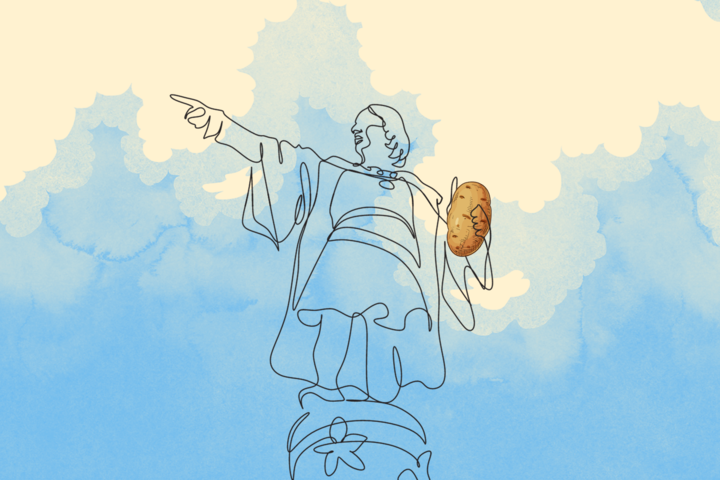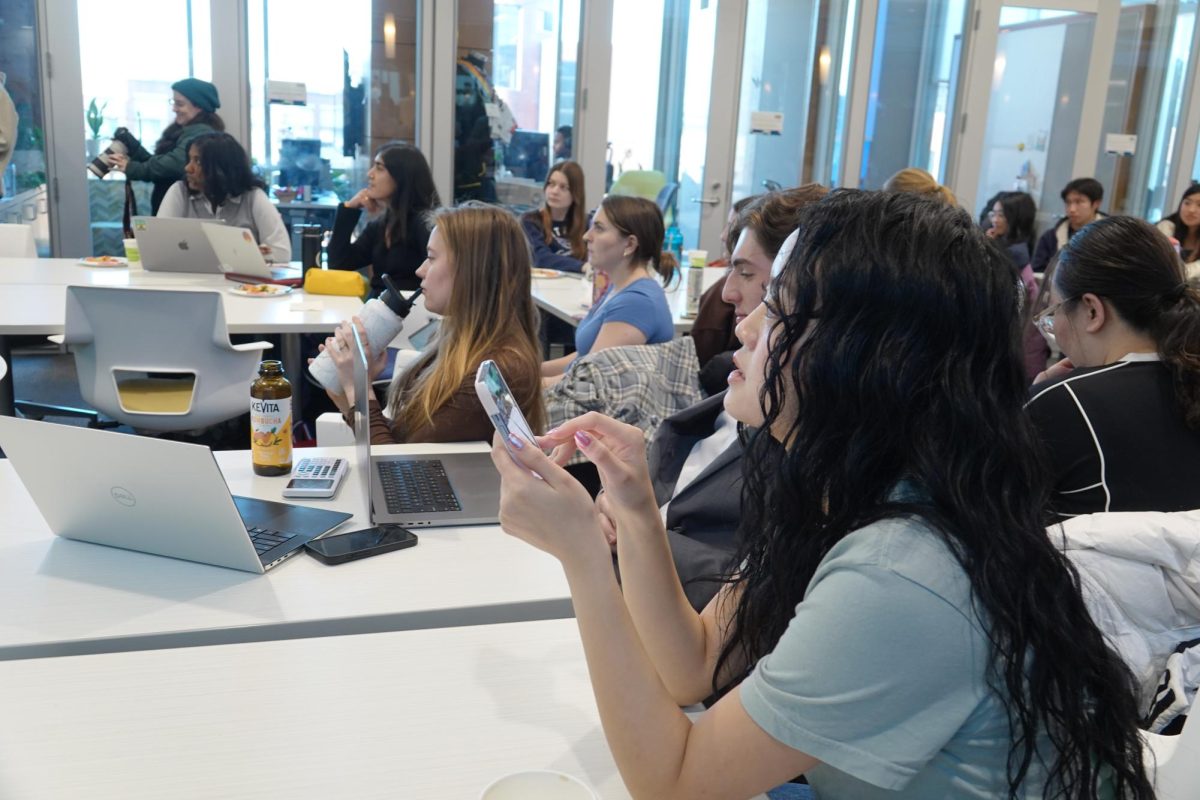You’re applying for a summer internship. You submit your resume the day it opens. But, do you spill and tell your friends about this opportunity? Or do you keep this one all to yourself?
Many of us Vanderbilt students built our high school lives around distant and idealized goals — particularly, getting into college. Whether we competed on the debate team, joined Future Business Leaders of America, or started our own nonprofits, we didn’t pause to breathe until we succeeded. Once accepted to an elite college, it is tempting to immediately fixate on another distant — and prestigious — goal. This time, maybe it’s a Big Four consulting firm, the Rhodes Scholarship or an Ivy League graduate program.
However, does achieving these idealized goals bring us satisfaction? There are costs to seeing life as no more than a series of objectives with competition and insecurity scattered in between. The “achievement mindset” that many Vanderbilt students cannot escape from threatens to leave us unsatisfied and unfulfilled.
Where does the “achievement mindset” come from?
In high school, many of us fixated on schools like Harvard, Yale, and for some of us, Vanderbilt, believing that achieving admission to one of these elite institutions would solve all of our insecurities. We would receive academic and societal validation for our years of sacrifice. Young people are told far too often that material success or being the “best” will make them happy, a message that destroys self-esteem and identity development, regardless of whether or not one achieves these goals.
During my freshman year at Vanderbilt, with college admissions finally behind me, I found myself searching for a new purpose. My upbringing made me feel like I needed another prestigious goal to set my sights on during college, and the ambitious environment at Vanderbilt validated this idea. I met upperclassmen interning at top technology and consulting firms and began applying to a series of ultra-competitive student organizations. Once again, I felt like I needed to achieve to be happy. Before I knew it, I was in another anxious race to the top.
My experience as a freshman is not unique. In high school, we were never taught how to slow down, enjoy success or even be happy, only to continue striving for perfection. When we get to Vanderbilt, we realize that this school doesn’t solve our problems and make us the Blair Waldorfs of the South. We are faced with a choice: either continue on the straightforward but unsatisfying overachiever path or start the challenging work of finding our true purpose.
Of course, money is a necessity, and it is natural and admirable to strive for a good life for yourself. However, the temptation to continually achieve prestige or be the “best” can cause us to lose sight of the most important, intrinsic goals like supporting our family or getting a good education.
This temptation can be especially strong for students from low-income backgrounds, who may feel driven to excel to support themselves and their families. Striving for a better life for yourself can easily be confused with getting caught in the “rat race.” Focusing on a company name or competition threatens to leave us perpetually unsatisfied, because we are trying to resolve internal insecurities with external validators, but these insecurities will inevitably remain when we reach the top. Or, we will get stuck in the “Meritocracy Trap,” striving for the life we never had just to find that it is only guaranteed for those whose familial or class connections get them into universities and top companies. We will only find resolution for our deepest insecurities in our relationships — with others, and ourselves.
For many, the toxic college admissions mindset bleeds into college. We spend four years or more accepting exhaustion, sacrifice and all-nighters for that acceptance letter to a prestigious college, only to get to college where the goal-chasing process restarts. There are costs to putting achievement before your own well-being.
What is “imposter syndrome”?
Upon getting to campus, Vanderbilt freshmen are onslaught with grade deflation, a community of outrageously accomplished peers and pressure to join selective student organizations and secure a prestigious job.
The human mind determines how to deal with present challenges based on how it dealt with past challenges, even if such a reaction is no longer warranted. For example, someone who had an argumentative parent might react aggressively to their peers, even if they are not being provoked. Likewise, if your high school identity was based on striving for college, you may fixate on a similarly distant and promising goal in college, even if it no longer makes you happy, or never did in the first place.
Many student organizations at Vanderbilt require applications. The most selective organizations — including business fraternities, Students Consulting Nonprofit Organizations, Investing Club and various executive boards — accept as low as 5-10% of applicants. Many even boast their low acceptance rates. When I was a freshman, many upperclassmen recommended I apply to these organizations to network and improve my job prospects but warned me that I’d most likely be rejected. Is it constructive to build your idea of success on an organization that you have a 90% chance of being rejected from?
While these organizations are known to provide “pipelines” into careers like consulting and finance through their alumni networks and internal resources, viewing them as the only path to success is blatantly wrong. Anyone who develops a network through students in their classes and professors can reap the same benefits from social connections as a student in one of these organizations. Pinpointing a prestigious name as one’s goal — whether a club, company or school — doesn’t enhance success, but induces anxiety that makes it harder for us to adapt and recover from failure.
These hyper-specific and idealized goals are the root of imposter syndrome — that feeling that you don’t deserve your spot in the room, or may even be here by some accident in the admissions office. We tell people struggling with imposter syndrome to simply “believe in themselves,” but this advice is insufficient. People struggle with imposter syndrome because they strive for goals out of a lack of belief in themselves, engaging in harsh competition without ever asking themself if this goal is what they want. They seek admissions to prestigious colleges, organizations or companies in an attempt to alleviate their insecurity. When external success doesn’t change internal security, they are left feeling like the imposter they always feared they were.
Is there a remedy for imposter syndrome?
Attaining our goals will never alleviate the insecurity caused by the achievement mindset. Instead, we need to abandon standards of achievement imposed on us by other people and discover what really drives us. This doesn’t mean abandoning all motivation for money or material success, but opening your mind to your unique vision for your life.
You may discover a passion for working in startups instead of a highly prestigious consulting company or aspire toward becoming an author instead of going to law school. You may even discover an interest in healthcare that doesn’t require you to be a pre-medical student.
It is normal to not know who you are in high school and college. But, this confusion can cause young people to defer to others regarding what they should strive for. For instance, fierce competition around finance and consulting jobs may make students believe that these are worthwhile goals or the only way to be successful. This is part of the reason why many Vanderbilt students enter the same few industries—finance, consulting, and software engineering, to name just a few. While some people will be happy working in these fields, others will discover that it was never what they wanted to do in the first place.
Carl Jung coined the term “individuation” to describe the development of one’s identity which occurs in young adulthood. In college, our lives are no longer a sum of what our parents and teachers tell us to do. We don’t all play the same sports or have the same friends. Figuring out your life is not as simple as using the U.S. News college rankings to choose your top choice school. Personally, as a sophomore in college, I’ve realized I have no idea what I want to do with my life — and that is perfectly fine. In fact, college is the time to discover that. The pressure put on students to achieve great things all the time forces us to make decisions that might not be right for us.
The costs of competition to our relationships
Happiness doesn’t come from what you do but from your relationships.
This is an absurdly simple idea that most of us forget to live by. Building our lives around achievement causes us to put winning before honesty or kindness, damaging our relationships.
Many students prioritize achievement over honesty; it doesn’t matter what you actually achieve, but how it sounds. In a survey of 1250 white college students, 34% admitted to lying about their race on their college applications. Even more exaggerated their extracurriculars and achievements. It is not sustainable to teach young people to value the end goal over effort so much that they feel the need to lie about the core of their identity.
Relationships fill our lives with purpose and meaning in a far more powerful way than jobs and material successes can. Staying quiet about opportunities or lying about achievements on your resume doesn’t just cost you your integrity, but also your relationships. When does it stop? When do we stop lying to people we love and start valuing what really matters?
Valuing the goal over the process also limits personal improvement. When I was on my high school debate team, some teams expected debaters to disclose their opening arguments before the round. Some debaters would resist disclosing their research to gain an advantage. One day, a boy on my team said, “I used to hide my arguments until I realized that it’s a sign of insecurity. Confident debaters know they can be honest about their arguments and still succeed.” In the face of the achievement mindset, we also devalue collaboration and leadership skills. Valuing one’s own success over all else will not make you a good collaborator or leader – valuing relationships will.
Likewise, if you are confident that a job is right for you, you will be prepared to take on the competition. In fact, you will be incentivized to improve yourself rather than value the appearance of achievement alone, which may even make you more effective in achieving your goals. Research shows that people motivated by intrinsic rather than extrinsic values are more likely to succeed. Valuing extrinsic goals causes us to be emotionally affected by setbacks that we can’t control along the way, which motivates cheating and, cyclically, also worsens imposter syndrome.
I am not suggesting to stop valuing your education or post-graduation income, but to be mindful of your intentions and relationships on any career path that you pursue. Ask yourself honestly if you are pursuing consulting or medicine or law because you are passionate about the field or because you want to be perceived as the “best.” The achievement mindset we’ve learned in high school and college, alone, will bring us anything but happiness.
While valuing achievement over the journey is a recipe for imposter syndrome, valuing effort and prioritizing one’s personal values is essential to honing the confidence essential to true and fulfilling success.
So, would you share that job opportunity with your friend?













